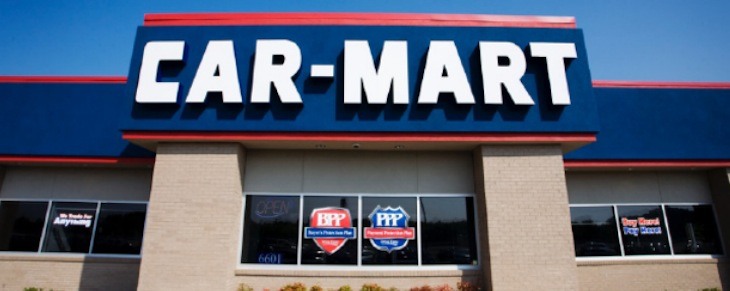Car-Mart earnings, revenue to rise in third quarter; wholesale vehicle prices fall
by February 13, 2019 2:46 pm 363 views

America’s Car-Mart is expected to see earnings rise more than 70% in the third quarter of fiscal 2019 as wholesale used vehicle prices declined for the third consecutive month in January.
The Bentonville-based buy here, pay here used car dealer on Tuesday (Feb. 19) is expected to report third-quarter earnings rose 71.7% to $1.03 per share in the quarter that ended Jan. 31, from 60 cents per share in the same period spanning 2017 and 2018, based on a consensus of four analysts. Revenue should rise by 11.4% to $163.96 million.
In the same period in fiscal 2018, net income was $13.369 million, or $1.82 per share, including the effects of tax reform and a one-time retirement bonus to former CEO Hank Henderson. Excluding those effects, earnings were 60 cents per share.
Car-Mart announced in November it would open three dealerships, with two in central Arkansas. The company had 143 dealerships and about 74,000 active loans at the end of its second quarter.
In a report on auto finance companies including Car-Mart, equity analysts John Hecht, Kyle Joseph and Michael Del Grosso and equity associate Trevor Williams, all of Jefferies, said the market factors related to the companies are constructive, and despite recent pullbacks and general market concerns, operating conditions reflect a balanced market with reasonable volumes, stable credit and supportive values. Used car volumes and financing opportunities are expected to support consistent loan volumes as credit trends have been in line with expectations. The wide price difference between new and used vehicles has supported used car sales, and the higher volumes should lead to a period of reasonable loan volumes.
“All of these factors are further emphasized by the continued auto tariffs with China, which have made used cars more attractive relative to their new counterparts and have strengthened residual values to date,” said Hecht, Joseph, Del Grosso and Williams.
Competition looks to be balanced, and credit has tightened, boosting credit performance and reducing investor concerns, according to the Jefferies analysts. Over the nearly past two years, the industry has moved from intense competition to more rational competition. At the same time, credit has become tighter, especially in the subprime segment, while credit scores have risen. Net charge-offs and delinquencies have declined over the past year as a result of the tightening in the industry in late 2016 and 2017. Rising loan terms are viewed as an industry risk, but terms are increasing in part because vehicles are lasting longer. The result of the terms are lower monthly payments, but overall terms have only risen slightly.
For Car-Mart, net charge-offs, which are losses as a percentage of gross finance receivables, are expected to be 26.4% in the third quarter, from 29.5% in the same period spanning 2017 and 2018, according to Hecht, Joseph, Del Grosso and Williams. They reduced Car-Mart’s 12-month target price by $1 to $81, and give the stock a hold rating.
Shares of Car-Mart (NASDAQ: CRMT) closed Tuesday (Feb. 12) at $78.31, up $1.41 or 1.83%. In the past 52 weeks, the stock has ranged between $100.75 and $44.05.
PRICE, SALES TRENDS
The Manheim Used Vehicle Value Index rose 3.3% to 135.4 in January, from the same month in 2018. Wholesale used vehicle prices fell 1.62% in January, from December. Prices declined similarly at the end of 2017, and the values of 3-year-old vehicles declined faster than normal, especially for the start of the year.
“As was the case throughout 2018, more affordable vehicles continued to see the greatest increase in values in January,” according to Manheim. “Compact cars and midsize cars outperformed the overall market, while utility vehicles and pickups underperformed the overall market.”
Used vehicle sales fell 1.1% in January, from the same month in 2018, according to Cox Automotive. Used vehicle seasonally adjusted annual sales are expected to be 38.8 million, down from 39.2 million in the same month in 2018.
